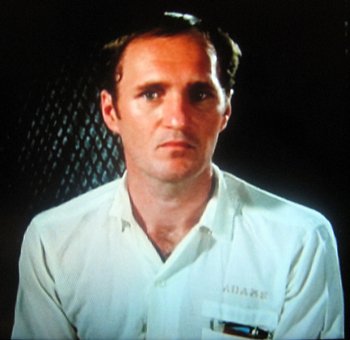 Randall Dale Adams After running out of gas on November 27, 1976, Randall Dale Adams was walking along Fort Worth Avenue in Dallas, Texas, when 16-year-old David Harris picked him up in a stolen car. The two ended up spending several hours together, smoking marijuana, drinking, and watching porn at a drive-in theater before Harris dropped Adams off at the motel where he was staying. Later, Harris was pulled over for driving without headlights. He shot Officer Robert Wood at least four times, killing him. A second officer, Teresa Turko, was drinking a milkshake in the patrol car at the time. As Harris sped away, she shot at his car, but missed. After bragging to friends that he’d killed a cop, Harris was brought in for questioning. When told that the bullets that had killed Wood matched Harris’s .22, Harris claimed that Adams had fired the gun, and that he had been a passenger at the time.
Adams was questioned by the police, and signed a statement detailing his activities on the day of the crime. At trial, police used this statement as an admission of guilt because Adams mentioned that he had been near the intersection of the shooting earlier in the day. Three eyewitnesses – all strangers to Adams – testified against him at trial. A couple, Emily and Robert Miller, said they saw the car after it had stopped, but before the shooting. They identified Adams as the only person in the car at the time. Emily Miller testified that she had identified Adams from a lineup. It was later revealed that she was unable to identify him until a police officer told her who to pick, that in exchange for her testimony robbery charges against her daughter had been dropped, and that she had originally claimed the man she had seen was Mexican or African-American (Adams was white.) The third eyewitness said that he had seen two people in the car, and that Adams was in the driver’s seat. A jury convicted Adams of murder.
At sentencing, Dr. James Grigson testified that Adams would be dangerous unless executed, and based upon this testimony, Adams was sentenced to death. Dr. Grigson, known as “Dr. Death,” provided nearly identical testimony in over 100 other death penalty cases, leading him to be sanctioned twice by the American Psychiatric Association, which takes an official position that the threat of future violence is impossible to predict and that it is unethical for psychiatrists to give testimony claiming to make such predictions.
In 1985, documentary filmmaker Errol Morris came to Texas to make a film about the notorious Dr. Grigson. In the course of his research on Grigson, Morris interviewed Adams, and became so intrigued by his story that he decided to make a film about Adams instead. Looking closely into the Adams case, Morris uncovered information about prosecutorial misconduct, hidden exculpatory evidence, and Harris’s criminal activity subsequent to the murder of Officer Wood. Among other violent crimes, Harris had been convicted of murder and sentenced to death. If not for the false conviction of Adams, Harris might have been arrested for the murder of Officer Wood, and another murder prevented. Harris was ultimately executed on June 30, 2004.
Based on the evidence discovered by Errol Morris, attorneys for Adams filed a motion for a new trial in 1988, and at the three-day hearing, Harris recanted his testimony against Adams. On March 1, 1989, the Texas Court of Appeals granted Adams a new trial. Three weeks later, Adams was released on his own recognizance, and two days after that, the district attorney dismissed all charges. Morris’s documentary, The Thin Blue Line, tells the story of Adams’s case.
At the time his case was dismissed, wrongly convicted prisoners in Texas could get a lump sum payment of $25,000 if pardoned by the governor. But Adams was ineligible because he had not been pardoned. He also did not qualify for the $200 given to prisoners when they are released on parole or on the completion of their sentences. Adams died in 2010 at age 61.
– Alexandra Gross |